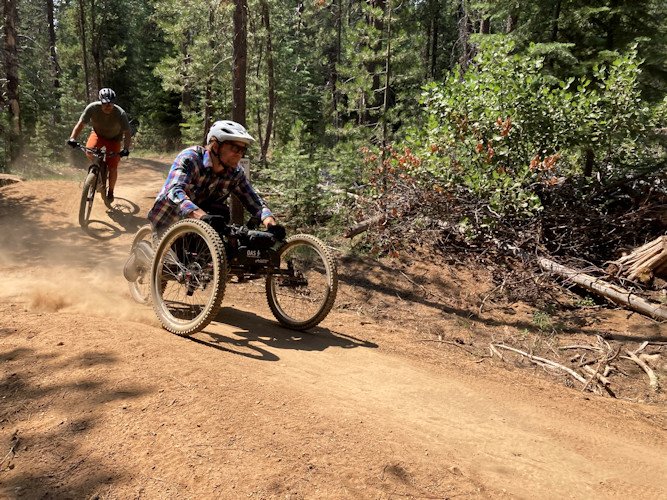COTA’s next project to assess Bend mountain bike trails’ accessibility for adaptive riders

'I’m excited to put Central Oregon on the map for the adaptive cycling community'
BEND, Ore. (KTVZ) -- The Central Oregon Trail Alliance has announced an upcoming trail assessment project to increase mountain bike trail accessibility for riders of adaptive mountain bikes in Bend.
In collaboration with key leaders in accessible recreation, COTA aims to enhance the riding experience for athletes with disabilities by providing better documentation to promote accessible riding opportunities in the region.
From May 1-14, a team of adaptive mountain bikers will assess 100 miles of trails near Bend, including the trail experience, trailhead facilities, and accessibility barriers. The project will also include a community day on Saturday, May 6 at LOGE Camp Bend, where anyone in the community can meet the team while learning more about accessibility and celebrating the Central Oregon mountain biking community.
COTA's trail assessment is managed by Empowering Access, which is owned by Ashley Schahfer, who leads disability equity and inclusion consulting in the built environment. The on-the-ground team will be led by Quinn Brett and Joe Stone of Dovetail Trails. Their combined expertise will ensure that the project provides tangible data, recommendations, and education to facilitate an inclusive trail environment in Central Oregon.
Additional project partners include Oregon Adaptive Sports (OAS), a local nonprofit that has been guiding adaptive athletes on skiing and biking adventures in Central Oregon since 1996, and the International Mountain Bicycling Association (IMBA), which facilitated a private grant that made the work possible.
During the two weeks the adaptive rider team is doing the assessment, they will ride trails each day and document key components such as trailhead accessibility, signage, trail tread width, trail features, and cross slope.
This information will then be publicized on COTA’s website and through other means so that adaptive riders can make informed decisions about what trails they would like to ride based on their equipment, injury, and skill level.
Often, the biggest barrier preventing an adaptive mountain biker from successfully navigating a trail is simply the lack of information available.
Among the 100 miles of trails that will be assessed are classics such as Phil’s, Tiddlywinks, Whoops, and Tyler’s Traverse. OAS staff already guide clients on these trails, and they and many other trails are mostly or fully rideable by adaptive athletes, however this information has not yet been documented and publicized to the adaptive cycling community.
COTA estimates most of the trails assessed will be fully rideable by adaptive cyclists. Based on the experience from OAS and local adaptive riders, it is anticipated that there are opportunities for trail improvement that will be identified.
For example, on Tiddlywinks, one rock feature currently prevents adaptive riders from riding the entire 7-mile trail independently. A suggested improvement may include developing an alternate route around such an obstacle to not eliminate or change any existing trail features but provide options for riders of varying abilities that align with the character of the rest of the length of the trail.
COTA Trails Program Manager Alex Brieger will work with COTA volunteer Crew Leaders to review the feedback and consider options to increase the rideability for adaptive riders, while maintaining the intended character of the trail. “If we add an alternate line around that feature [on Tiddlywinks], my guess is more than a few non-adaptive riders will also be very excited about it,” Alex said.
Any trail alterations or improvements would go through COTA’s existing maintenance and development protocols including working with the U.S. Forest Service through the National Environmental Policy Act where applicable.
“I’m excited to put Central Oregon on the map for the adaptive cycling community,” said Abbie Wilkiemeyer, COTA’s volunteer project manager. “Other communities such as Bentonville, Arkansas, are using universal design to open trails of all difficulty levels to adaptive mountain bikers. If they can do it, we can do it.”
“All of the COTA Crew Leaders that are participating in the assessments are looking forward to this opportunity to learn and see what works and what doesn’t for riders of various skill levels and on different equipment on our existing trails,” Wilkiemeyer continued. “As the word is spreading about this project, volunteers are reaching out to see how they can get involved, which speaks to what I hope will be great engagement for future trail projects that result from the assessments.”
About Central Oregon Trail Alliance (COTA):
COTA is a non-profit organization dedicated to the development, protection, and enhancement of the Central Oregon mountain biking experience. Through trail stewardship, advocacy, collaboration, and education, COTA maintains over 600 miles of singletrack trails across six chapters.
For more information about the project or to get involved, please contact COTA representative Abbie Wilkiemeyer at abbie.wilkiemeyer@cotamtb.com or visit our website at https://www.cotamtb.com/.